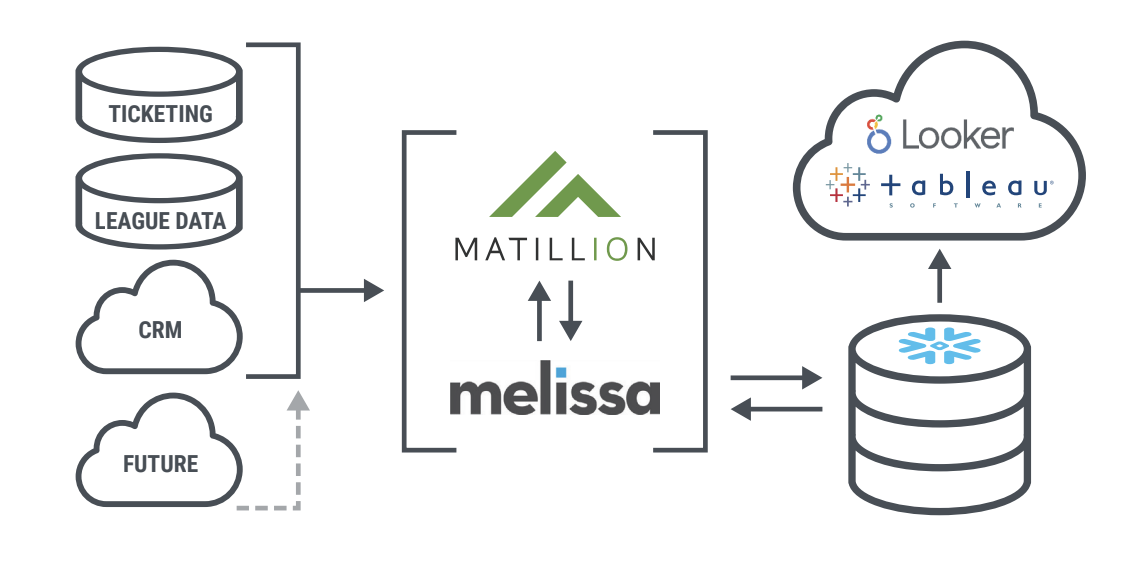How the Las Vegas Raiders Used Master Data Management to Build a Fan “Golden Record”
In the sports and entertainment world, many organizations are working hard to create a “Golden Record” for every customer or fan. If done correctly with master data management (MDM) best practices, this Fan Golden Record allows organizations to integrate all of their unique customer data from across multiple data sources into one record. It enables teams to create a high quality, personalized fan experience inside and outside the stadium, driving fan engagement and improving revenue.
But creating an MDM Golden Record is typically not as easy as it sounds. A professional sports team, for example, needs to not only attach individual ticket sales information to a fan, but also include other data such as fan demographics, frequency of game attendance, number of tickets purchased, merchandise sales, concession data, interaction with the team’s website, social platform interaction, and more.
In this article, we will discuss a potential solution for creating a Golden Record by leveraging master data management and data integration best practices. We’ll reference the example of the Las Vegas Raiders, showing how Data Clymer leveraged an MDM process to help them pull data from four primary data sources (Ticketing, Salesforce, Acoustic, and Formstack) and create a Golden Record for each fan.
What is Master Data Management?
Master data management, or MDM, is often associated with creating a single master record (or “Golden Record”) for each person, place, or thing in a business across internal and external data sources and applications. The information in this record has been de-duplicated, reconciled, and enriched, making it a consistent and reliable source.
Once created, this master data serves as a trusted view of business-critical data that can be managed and shared across the business to promote accurate reporting, reduce data errors, remove redundancy, and help workers make informed business decisions. The most important aspects of this definition are:
- Data comes from multiple sources and applications
- Records are de-duplicated, reconciled, and enriched
If executed correctly, MDM as a process is valuable to every data consumer within an organization. It consolidates all of the data about a single person, place, or thing into one master record. This avoids any possible confusion about where certain information may be stored or analyzed, creating a single source of truth for that person, place, or thing.
Creating a Fan Golden Record for the Las Vegas Raiders
Identifying data sources
To get started with our MDM solution for the Las Vegas Raiders, we first needed to understand what data sources would be needed in order to create our Golden Record. This is different for every organization, but it is typically focused around some sort of event data, which is then enriched with marketing and sales data. Specific to the Las Vegas Raiders, the source event data came from their ticketing platform. This ticketing data was then integrated with marketing and sales data from Salesforce, Formstack, and Acoustic.
Creating a process for data integration
Once all data sources were identified, we needed to create a process for integrating this source data within a centralized location. More specifically, we needed an automated ETL / ELT process and a cloud data warehouse. For this use case, we selected Matillion ETL and a Snowflake data warehouse. We also selected Melissa Data as the tool to help ensure data quality.
Here is a high-level image of the sports data warehouse and data stack that we elected to use.

After tool selection, our first step was to use Matillion to extract the data from each of the four primary data sources individually and load them into Snowflake. Next, we created a single table that included contact data from each separate data source. This unioned table is the list of contacts that we will be utilizing in the Melissa Personator and Matchup processes to consolidate and deduplicate data across all our data sources. We triggered the Personator and Matchup jobs within Melissa by using a Python script.
Ensuring data quality
Each contact was run through the Melissa Personator process, which validated that all the names, addresses, and other information was correct. Each validated record was then sent back to Snowflake in the form of JSON, with a series of result codes that can be found in this Melissa Data Wiki page.
The contacts were also run through the Matchup process, which analyzed each record for possible matching or linked records. This is the concept of “fuzzy matching.” (Think Joe Smith and Joseph Smith being paired together.) Any “fuzzy” records were sent back to Snowflake in the form of JSON with the same series of result codes to help indicate record disposition and status.
Putting This MDM Golden Record Data to Use
After creating a list of contacts that had been verified, analyzed, and tested for matches, we wanted to consolidate any matches across our dataset and select the best aspects from each record. To properly execute on this process, we had to establish winning criteria and data source priority.
In this case, ticketing data was the highest priority, followed by Salesforce, Acoustic, and then Formstack. Once we scored each record with the winning criteria and source priority, we compared these new records to the existing records in Snowflake.
We then broke these records into three categories:
- New Contacts: All new contacts were inserted into the master table.
- Updated Contacts: Contact updates triggered an update of a single record that has the same ID as an existing record in the master table.
- Merged Contacts: Contact merges were records with matching names, emails, and other valuable information, similar to another existing record, but with a different ID. In those cases, we combined the two records into one.
Once the records were successfully inserted, updated, and merged, the MDM process was complete. We now had a “Golden Record” of each fan for the Las Vegas Raiders.
Since their initial creation, these records have been invaluable to business users at the Las Vegas Raiders. They have streamlined data analysis processes by delivering and consolidating all contact, or fan, data within a single source of truth. And this, in turn, has helped the Las Vegas Raiders to not only better understand and engage with its fans, but also improve the performance of its data and analytics platform.
That’s what we’d call a win/win.
Ready to Build Your MDM Golden Record?
If your organization is struggling with any of the challenges outlined above and in need of a customer Golden Record or sports data solution, our team at Data Clymer can help! In addition to the Las Vegas Raiders, we have worked with many other sports and entertainment organizations including the San Francisco Giants, Minnesota Vikings, Seattle Seahawks, Indianapolis Colts, Big Ten Conference, NASCAR, and many others.
Explore our free collection of resources on data analytics in sports, or contact us to learn how we can help your team with its Master Data Management strategy.

John is a full cloud data engineer with experience in AWS, Tableau, and Matillion.

